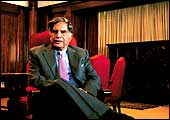 |
| Coca-Cola India's Gupta: He'll be pushing
something else soon |
Sanjiv
Gupta is going, but neither Coca-Cola India (CCI)-"He is
still very much our President"-nor the man himself-"I
have not resigned yet, but cannot comment on the future"-will
say so. So, what's the real story at CCI?
The $22-billion (Rs 96,800-crore) Atlanta
based Coke got itself a new Chairman and CEO, Neville Isdell last
year. Isdell, a Coke veteran who was called back from retirement
to head the company, has taken the view that the Indian subsidiary
has to fall in line with the company's global model of separate
bottling and concentrate/marketing companies.
That's understandable; as is Gupta's decision
(as and when he announces it) to leave; after all, with the larger
company-owned bottling operations (some Rs 3,000 crore of total
revenues of around Rs 4,000 crore) being headed by a new CEO,
John Ustas, his brief has just been split down the middle. As
this magazine goes to press, there is speculation in headhunting
circles that an Indian from Coke's international network, Sanjay
Guha, Atul Singh or Kandy Anand could replace Gupta.
If, despite the fact that both companies have had to cope with
similar extraneous factors-a slow-growth market and the pesticide-in-colas
controversy, for instance-Pepsi's Indian operation seems like
a rock of stability (it has had only two CEOs in 16 years, p.m.
Sinha and incumbent Rajeev Bakshi), blame it on the Indian subsidiary
of Coke mirroring events in Atlanta.
Coke's global operations have had four CEOs
in the past 13 years (Pepsi has had two, including incumbent Steve
Reinemund), and it would seem that each (both global and local)
has had different plans for the company. One wanted to buy bottlers.
Another wanted to sell tea and coffee. And still another wanted
to kill all the brands it had acquired. Circa July 2005, there's
static that Coke will go slow on investments in India, go cold
on tea and coffee, ditch the Rs 5 price-point, and focus on Brand
Coke. "We have over a 60 per cent share of the market,"
says the company's spokesperson. "Thanks to the acquired
brands," says an unkind critic. Then, that would seem to
be true. The acquired brands account for over half the company's
sales and a fifth the marketing spend.
-Shailesh Dobhal
The
First Deal
In the CDMA space, that is.
 |
| Tata's Tata: The company's still looking |
If
reports emanating from Mumbai's deal street are to be believed,
Tata Teleservices (TTSL, in which Tata Group firms VSNL, Tata
Sons and Tata Power hold stakes) is close to striking India's
first deal in the CDMA space (the Reliance Infocomm-Qualcomm Inc.
deal, for those who came in late, fell through). In front of the
pack, seeking to acquire a 30 per cent stake in the company, is
Korean telco sk Telecom. If it materialises, the deal could be
worth Rs 3,500 crore (between Rs 15 and Rs 19 a share). That money
will come in useful for a company that will invest Rs 9,000 crore
across its 20 circles over the next 24 months. After a sluggish
start, TTSL has been in a hurry to make up for lost time and has
added 1.69 million subscribers over the past six months (total
subscribers: 4.5 million at the end of June 2005).
The Koreans, the buzz in Mumbai goes, have
taken over Bombay House, the Tata Group HQ, a reference to the
large team from SK Telecom (it is represented by i-banking firm
JP Morgan) that has apparently been camped there for some time
hoping to strike a deal. For its part, the Tata Group downplays
the possibility of an immediate deal, with group sources saying
that SK Telecom is only one of the companies the group is taking
to and that "there are about five-six players in all"
that are interested in a stake in Tata Teleservices. The way these
things work, a deal could be announced tomorrow, or six months
down the line.
-Krishna Gopalan
An Idea In Play
Another telco, another deal.
 |
| Idea CEO Vikram Mehmi: It's on |
The
idea story has taken another turn. The company, which was formed
by the merger of the GSM-telephony interests of the Tata and Aditya
Birla Groups and AT&T, has had one door close-the proposal
by Singapore Technologies Telemedia and Telecom Malysia to acquire
a 47.7 per cent stake in Idea was scotched by the Department of
Telecommunications on the grounds that another Singapore-government
owned firm SingTel owns a stake in Bharti, which shares some of
its circles with the company-only to have another open.
Today, the Aditya Birla Group, which was
once keen to sell its 33 per cent stake in the company and focus
on its commodities empire, has decided to stay on. And it may
actually surprise everyone by bidding for the 33 per cent of Idea
Cingular (it acquired this, courtesy its takeover of AT&T
Wireless) has put on the bloc, even for part of the Tata Group's
31.5 per cent stake in the company.
"The Aditya Birla Group is here to stay,"
says Sanjeev Aga, the group's representative on the Idea board,
refusing to spell out the details. It would make sense for the
Tata Group to exit, given its interest in the CDMA space (the
money, for sure, would come in useful). "We are all looking
at options and nothing firm has come up as yet," says Kishor
Chaukar, Managing Director, Tata Industries.
Then, there is the D-street buzz about Idea
going in for an initial public offering (IPO). With 5.55 million
subscribers across 8 circles, its valuation would be around Rs
8,000 crore, and an IPO may provide a profitable exit for some
of its shareholders. Watch this space.
-Krishna Gopalan
LEGACY-TRACK
What's Up?
 |
| R.S. Lodha: The smile stays, for now |
It's
been fairly smooth sailing for Rajendra Singh Lodha so far. On
June 24, the Board of Directors of M.P. Birla Group flagship Birla
Corporation elected him chairman. He is the first non-Birla ever
to head a major Birla company. A spokesperson for B.K. Birla said
the Birlas would not comment on this development. Meanwhile, in
a minor victory for the Birlas, on July 1, the Calcutta High Court
dismissed a petition by S.N. Prasad, a member of the Lodha camp,
seeking the quashing of criminal proceedings against himself,
Lodha and two others. The criminal case had been filed by Rajinder
Pansari, a Birla associate, on October 5, 2004 before the sub-divisional
judicial magistrate in Alipore. It alleged that Lodha, Prasad,
V. Gaurishankar and S.K. Daga had defrauded Priyamvada Birla.
The dismissal of Prasad's petition will not change anything in
the battle for the control of M.P. Birla's estate. It merely means
that the Alipore Court will be free to proceed with the criminal
case filed before it. The Lodha camp declined to comment on the
issue.
-Arnab Mitra
The Dabhol
Endgame
An FAQ on the impending resolution.
Is the Dabhol controversy ended?
Almost, but the company is no longer called
Dabhol Power Company; it is the Ratnagiri Gas and Power Company.
How has the resolution come about?
The court controlled entity will soon be
taken over by the special purpose vehicle instituted by the government
for the purpose. $110 million (Rs 484 crore), of the $145 million
(Rs 638 crore) owed to GE has been paid. On the agenda is the
payment of $160 million (Rs 704 crore) to Bechtel, $230 million
(Rs 1,012 crore) to offshore lenders, and $111 million (Rs 488.4
crore) to Overseas Private Investment Corporation. All this is
expected to be done by the end of July.
Will the company's new cost structure
be more reasonable?
It will. "The original project cost was
Rs 12,000 crore; this is down to Rs 10,000 crore now with Enron's
equity being devalued from $550 million (Rs 2,420 crore) to $20
million (Rs 88 crore); then, DPC was also planning to make money
on everything from fuel arbitrage and shipping contracts to operation
and maintenance charges. Now, the annual payment by the Maharashtra
State Electricity Board will be in the region of Rs 3,500 crore
a year as against the earlier Rs 5,500 crore," says Girish
Sant, an energy consultant at Pune-based Non Governmental Organisation
Prayas.
Isn't Rs 10,000 crore a bit steep for
a 2,184-MW project?
It is, and that's something that will come
up when Ratnagiri Gas and Power Company seeks the approval of
Maharashtra Electricity Regulatory Commission (MERC) to kick-start
operations. It will have to justify a 25 per cent higher cost.
"The challenge is to find liquefied natural gas (LNG) cheap;
that's the key to the issue (of supplying power at the government
mandated rate of Rs 2.30 an unit and staying profitable),"
says one analyst.
It isn't over yet?
Well, nothing ever is until the fat lady
sings.
-Priya Srinivasan
INDEPENDENCE
Diesel At Rs 7 Less
 |
| Reliance diesel: It costs the same,
says the firm |
The all India
Motor Transport Congress (AIMTC) has an interesting complaint
to make, that Reliance Petroleum sells diesel to trucks registered
in Delhi, in Mumbai, at Delhi rates, some Rs 7 less than what
the fuel costs in the city (immediately attracting business from
the thousands of trucks that ply from Delhi to Mumbai). The association
is aware that the company is free to do as it pleases (the pricing
can be explained away as a discount). Its real grouse is that
public sector firms that dominate the country's petrol and diesel
distribution network do not do the same. "If Reliance can
afford to sell diesel at this rate, why not the PSUs?," asks
J.M. Saksena, Advisor, AIMTC. Then, a Reliance Petroleum spokesperson
denies that the company is doing any of this.
-Priyanka Sangani
ADVANCE BOOKING
The Early Bird
 |
| Happiness explained: They already have
jobs |
It is only a
matter of time before anyone who has just been granted admission
into an engineering school receives perhaps by the same mail that
brought the good tidings, a letter of offer from a tech firm provided
the candidate manages to finish the course by a certain time and
with a certain level of proficiency. Such is the demand for tech
jocks that Cognizant Technology Solutions has already 'hired'
500 students of Chennai's premier Anna University an entire year
before they graduate. "Business is picking up and our hiring
will keep pace based on demand," says R. Chandrashekharan,
Managing Director, Cognizant, deftly side-stepping the issue of
hiring young. Well, if the offshoring boom lasts (there is no
reason it shouldn't) hires will get progressively younger.
-Rahul Sachitanand
POTTERMANIA
July 16 Fundamentals
Three days after
this magazine hits the newsstands, the sixth book, the penultimate
one in the Harry Potter series is to be released. In India, where
publishers consider themselves fortunate if an English language
best-seller manages to clock 5,000 copies, advance orders for
the book number 130,000. "It has more than doubled since
the last one," says P.M. Sukumar, Senior Vice President,
Sales and Marketing, Penguin India, the company that has the trade
rights to distribute the Bloomsbury edition. And Scholastic India
will distribute copies of the book to some 5,000 schools across
India. India may account for a mere 2 per cent of the estimated
sales of the book, but Penguin is taking no chances with "guards
in Penguin- and distributor-locations" according to Sukumar.
The boy-wizard, who celebrates his birthday on July 16, has earned
it.
-Amanpreet Singh
|










